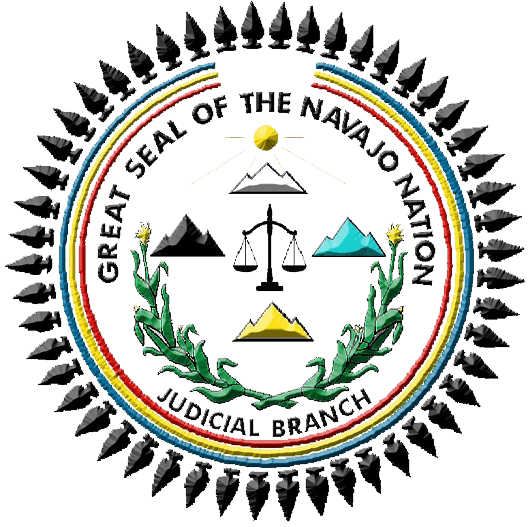Community Service Work Program Manual

- Judicial District Courts
- Employee Directory
- Public Forms
- Navajo Nation Laws Relevant to District Courts
- Civil Motor Vehicle Infraction Fines & Fees
- FAQs
- NNBA Rules of Conduct
- Rules of Court
- Navajo Garnishment Act Rules of Procedure
- Child Support Guidelines
- Civil Procedure
- Community Service Work Program Manual
- Criminal Procedure
- Declaratory Rulings on Questions of Navajo Law
- Domestic Violence Proceedings
- Evidence
- Exclusion Proceedings
- Garnishment Act Rules
- Policy on Appointment of Counsel & Indigency
- Pro Bono Rules
- Probate Procedure
- Repossession Proceedings
- Small Claims Proceedings
- Uniform Sentencing Policy
Navajo Community Service Work Program Manual
This Manual was adopted in Judicial Conference on October 26, 1995 by Resolution JB-O-01-95.
Purpose
The Community Service Work (CSW) program is designed to provide a context in which an adult offender can contribute to the well-being and betterment of the community. The CSW program is rehabilitative and provides vocational opportunities rather than punitive in nature.
Policy
It is the policy of the CSW program that the beneficiaries of the program will be the Navajo Nation and the Navajo populace in general. For this reason only qualified governmental, charitable, religious or educational entities and organizations will be approved as sponsors for the CSW.
Definitions
For purposes of this manual the following words and terms shall have the indicated meanings:
- Day Release Plan: The offender is released to the CSW program during the day and returns to incarceration in the evenings and on weekends.
- Home Community Plan: The offender’s home community or chapter proposes a plan which includes accepting the offender back into the community or chapter as a resident until the offender completes his/her assigned hours under the CSW program.
- Restricted Release Plan: The offender is released to the family as a resident of the home. The offender fulfills the CSW program hours during the day and returns to the residence for home detention in the evenings and on weekends.
- Sponsor: An organization or entity which is certified to participate in the CSW program and which provides a program and supervision.
Procedure for Program Director Qualifications
- A sponsor and/or offender should submit the attached written Request for Community Service Work to the court. The written request should contain a description of the type of work the offender will perform, the name of the supervisor, the location where work will be performed and the work schedule of hours.
- The request should indicate whether it is a Home Community Plan a Day Release Plan; or a Restricted Release Plan.
- The probation officer should review the written request and determine whether the sponsor and the specified project are qualified.
- If the plan requests a particular offender or sponsor, the probation officer should also determine whether the offender is eligible for the CSW program. If the plan is nonspecific as to an offender, the probation officer should match an eligible offender with the plan.
- Upon completion of the review and matching process the probation officer shall either submit the request to the judge for approval or inform the requesting sponsor and/or offender in writing as the reasons for disapproval.
- Upon approval of the request, the offender should sign a Written Agreement which sets forth the terms and conditions of the specific project and contains the following:
- Beginning and ending date of project;
- Number of hours offender will work;
- Description of counseling or other rehabilitative activity the sponsor will provide;
- A specific description of the work to be performed;
- Location of the work;
- Name and address of the sponsor and supervisor;
- Sponsor’s agreement to immediately notify the probation officer and any other appropriate official of any accident, injury, illness, unlawful act or other threatening event extenuating out of the project;
- Offender’s acknowledgment that he has fully disclosed on an Offender Information form all medical conditions, medications or work restricting condition known to him.
- The sponsor should provide a weekly written report to the probation officer certifying that both the offender and the sponsor are complying with the terms and conditions of the agreement.
- Upon completion of the Written Agreement, the sponsor shall submit a Conclusion of Community Service Work form to the probation officer. The probation officer should review the report and submit it to the judge with a recommendation as to disposition.
- If the judge approves the report he shall sign an order that the offender has completed the CSW program. If the judge disapproves the report he shall make an order regarding the further duties of the offender.
Qualifications
Certification
- The prospective sponsor shall submit the attached Request for Sponsor Certification to the judge in whose judicial district the entity or organization is located. The written request shall be signed by the person authorized to bind the requesting sponsor. The request shall also identify and describe the projects on which the community service worker will be utilized.
- The judge shall review each written Request for Sponsor Certification and may certify the requester as a sponsor or may decline the request with reasons stated in writing. The identified projects shall also be certified in whole or in part.
Project Guidelines
The following guidelines shall be considered in determining whether a project should be certified:
- Benefit to the community;
- Quality and quantity of supervision;
- Provision for protecting workers from inclement weather;
- Provision for feeding workers;
- Informational or educational content of project;
- Rehabilitative or restitutional aspects of project;
- Need of beneficiaries of project;
- Amount of degree of physical exertion required for project.
Sponsor Owned Property
Eligible Offenders
Upon the request of the judge, the probation officer should evaluate an offender for eligibility for the CSW program. The following may be considered in making the evaluation:
- The nature of the offense;
- Whether the offender is amendable to rehabilitation;
- Whether the offender is willing to fulfill the requirements of the program;
- The physical condition of the offender;
- Whether the offender has a medical condition which must be considered;
- Whether the offender poses a threat to himself or others;
- Escape risk of offender;
- Commitment of family to go through family counseling is such is a condition of the CSW program;
- Attitude and conduct of the offender while in detention;
- Offender’s ties to the family and community.
Offender Information Forms
Each offender considered for the CSW program should complete an Offender Information form which should contain information on:
- The offender’s family;
- The nature of substance abuse, if any;
- The offender’s medical and physical condition.
